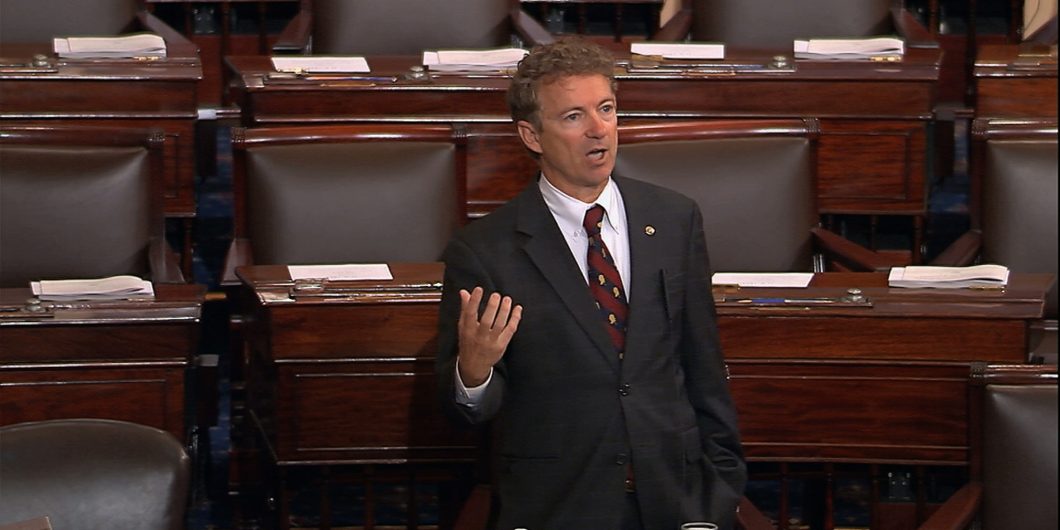How the Filibuster Strengthens the Republic
The most important issue in Washington at the beginning of the Biden administration is not any specific policy, but a central structural issue of government—the fate of the legislative filibuster. Minority Leader Mitch McConnell recognizes this essential truth, which is why he tried to get a commitment not to eliminate it, only relenting when two Democratic senators said they would not abolish it. In contrast, it is shocking to see David Brooks blithely call for its elimination if the Republicans use it to “obstruct,” as if the purpose of the filibuster has not generally been for a substantial minority to thwart important parts of the agenda of a narrow majority. The Democrats used it in just that way during the Trump presidency.
The Senate filibuster, which now requires 60 senators to vote to end debate before legislation moves forward on the merits, has existed in some form through the history of that institution—a fact that should give a self-styled conservative like Brooks pause before giving up on it. It may become a victim of our extreme partisanship, but its elimination would undermine good governance. The filibuster makes our polity more stable, promotes across-the-aisle compromise, tamps down on polarization, and protects federalism. It does have some costs in terms of clear accountability, but those could be reduced by moving back to a regime in which senators would be required to hold the floor to prevent a vote on the merits.
One of the greatest concerns of the Founders was the instability of excessive democracy. Elections represent a snapshot in time. They capture the ever-fluid priorities and preferences of voters only at a given moment. For instance, the issues that motivated voters in 2020—Trump’s tweets and a recession-driven by the virus—may soon fade even as the representatives elected are empowered to pass vast amounts of legislation. As a result, at the next election, a new set of representatives returned in an election turning on a different set of accidents may repeal that legislation.
Such mutable laws have substantial costs. They make it hard for individuals and businesses to plan. They lessen the respect for law and government in general, as people become more likely to think that government does not know what it is doing. At a time when trust in government is near historic lows, confidence in our institutions needs to be husbanded, not squandered. A stable rule of law is one of the best ways to engender respect.
There is also another set of more extraordinary laws—such as entitlements or the admissions of new states to the union—that, once instituted, are hard to repeal and have huge consequences for the future, imposing costs on generations that are not voters and may be yet unborn. For instance, the additional social security benefits that Biden wants to provide are hard to take away and yet require future generations to pay for them. The filibuster is particularly important for this kind of law because they are constitutive of our nation going forward. As the supermajority rules for making our formal Constitution suggest, consensus is particularly important for laws that are difficult, if not impossible, to repeal.
The filibuster also requires some bipartisan buy-in on legislation. It is rare that either party achieves a 60-person majority. As a result, the filibuster tempers polarization. Democrats and Republicans must persuade some senators of the other party to agree to move forward. They can do that through compromise—and that moves legislation to the middle.
To address the filibuster’s costs, we might go back to the old-style filibuster, which required senators to hold the floor for hours.
When there are greater incentives to compromise, polarization is likely to decline because each party is less likely to become furious about what it regards as the enactment of extreme legislation of the other side. To be sure, people on the extremes may get angry that they cannot get all they want. But while such citizens may seem a majority on Twitter, they remain a distinct minority in our nation. Moreover, the shrewdest theorists of those on the right and left recognize that a compromise today sets up an argument for a settlement tomorrow that leans even father toward their preferences.
The Senate filibuster also protects federalism. Now that the Supreme Court has largely gutted the original constitutional limitations on the power of the national government and the Seventeenth Amendment has severed the relation between senators and their state legislatures, the filibuster provides the most practical protection of state autonomy. States can choose to exercise or refrain from exercising their very substantial regulatory powers unless there is a consensus represented by 60 votes in the Senate to tell them to do otherwise. That allows citizens in the states of a diverse nation to be governed by rules more to their liking, as well as those that fit their social and economic conditions. To take an example from the Biden agenda, a fifteen-dollar-an-hour minimum wage would be unlikely to surmount a filibuster, because of concerns about disparate local impacts. Wages and cost of living are far from uniform across the states. Such a minimum wage would derange enterprise in states that the majority party can ignore because they are not elected from them. As a result, there is an effort by some Democrats to avoid the filibuster and pass the minimum wage by stretching a process called reconciliation, though it will probably fail.
The filibuster does have one substantial downside. It allows senators to evade accountability because they can filibuster a bill and yet say they never voted against it on the merits, thus confusing citizens who do not understand the intricacies of the legislative process. But this seems a relatively small price to pay for the major benefits of the rule. And the filibuster could be reformed to address this problem by requiring senators who want to delay voting on the merits to go back to the old-style filibuster, famous from Mr. Smith Goes to Washington, where they are required to hold the floor for hours. That dramatizes their position and opposition to the underlying legislation.
Others have argued that the filibuster is a problem because it exacerbates the unrepresentative nature of the Senate. Forty senators who represent a relatively small number of people can block legislation that the majority wants. But the effect of the Senate’s unrepresentative nature, assuming it is a defect, is not limited to the filibuster but infects everything it does. And without the filibuster, a narrow majority representing a relatively small minority of citizens could more easily get a bill through the Senate. It is true that the House could block it, but much legislation needs to be passed to keep the government running, and should small states hold a majority, they would have considerable leverage over the result.
Moreover, as a practical matter, it is does not seem that the makeup of the Senate substantially differs from that of the House of Representatives ideologically. Nor does it systematically favor Republicans. Of the twelve smallest states (those with either one or two representatives in Congress) six are blue states and six are red states. Of the ten largest states, five traditionally vote red, and five generally vote blue. In the last generation (since 1990), Democrats have performed slightly better in the Senate, controlling it 15 and a half years out of 32 as opposed to controlling the House for 12 years out of 32. The politically similar composition of the House and the Senate is also suggested by the ideological proximity of their median member when a party controls both houses.
Defending the filibuster is not the same as opposing any reform of its practice. At one point the filibuster required a two-thirds vote to proceed to merits, and that proved too high a hurdle, prompting the move to the current 60 votes. Moreover, the Senate has eliminated the filibuster on motions to proceed to take up bills, thus streamlining its process. But the need for a modicum of national legislative consensus to encourage compromise, temper polarization, and protect the autonomy of states is as great as any time in American history. The filibuster in some form must endure to help stabilize our republic, particularly at this turbulent time.


